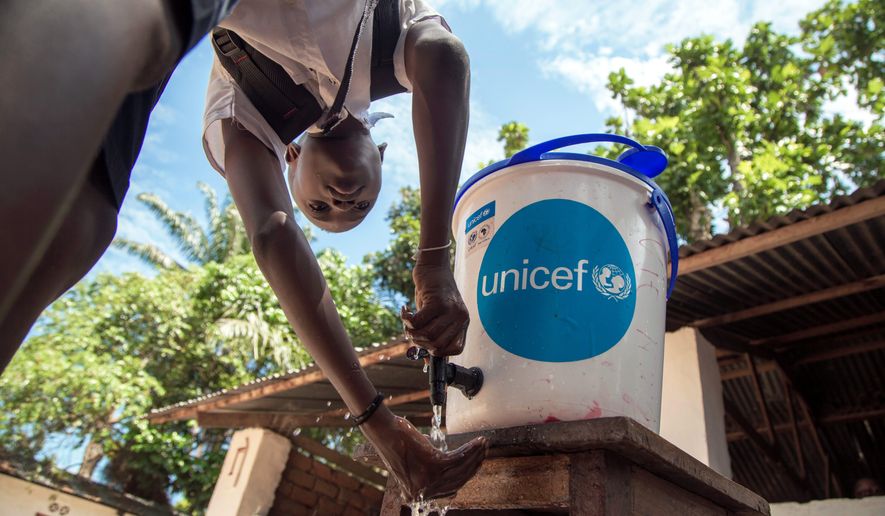With Ebola once again flaring up in an African country, U.S. health officials have briefed border officers about potential danger from travelers, and U.S. airports are beginning to issue warnings about the deadly disease.
Authorities say there’s no immediate danger and they’re better prepared should the outbreak begin to spread beyond the Democratic Republic of Congo. But the briefings and precautions are part of an effort to get out in front of the risks.
The Centers for Disease Control and Prevention say electronic signs at more than 20 airports — from Seattle to San Juan, Puerto Rico, — urge travelers arriving on indirect flights from Congo to know the symptoms of Ebola, monitor themselves and contact a doctor if they feel sick.
And roughly 6,500 Customs and Border Protection officers have received pre-shift briefings raising awareness.
“I would just say this is prudent, pro-active outreach and education. We know that information is helpful,” Deputy CDC Director Anne Schuchat told The Washington Times. “We think the most important feature right now is intensive outreach at the source where the outbreak is occurring. That’s really where the emphasis right now.”
The World Health Organization counts 58 cases and 27 deaths in Congo’s outbreak of Ebola, which is transmitted from wild animals to people and spreads human-to-human via the bodily fluids of infected people.
With the disease touching Mbandaka, a large city on the Congo River, WHO officials are worried about a fast spread to other population centers.
Still, WHO insists it’s well-equipped to contain the disease and prevent the panic that accompanied the last outbreak in West Africa that peaked in 2014 and claimed more than 11,000 lives.
That outbreak sparked the Obama administration to post warnings and funnel travelers from affected countries to five international airports in the U.S., where they were screened for symptoms and ordered to check in with local health officials for weeks afterward.
“I think they worked well once they were implemented. They were quite intensive, so tens of thousands of travelers were checked,” said Tom Frieden, who served as CDC director under President Obama during the outbreak. “I think the approach of creating what is essentially a closed circuit, where you know everyone who is leaving and everyone who arrives — it makes a lot sense.”
Some states, though, went further in 2014 and announced quarantine policies that snared aid workers returning to the U.S. after helping out in West Africa.
As a private businessman, Mr. Trump sided with those hard-edged policies.
“The U.S. cannot allow EBOLA infected people back. People that go to far away places to help out are great-but must suffer the consequences!” he tweeted in 2014.
The new outbreak presents the first global health scare on his watch.
The White House’s National Security Council says the threat to the U.S. homeland remains low, so air travel restrictions aren’t warranted at this time. An aide also noted that travelers who leave Congo are being screened for Ebola before departing.
In the meantime, CBP officers are getting a heads-up about the situation abroad as part of a routine surveillance program known as “RING,” which stands for Recognize, Isolate, Notify, and Give support.
“Officers are trained to recognize potential public health threats. If they are suspicious about signs or symptoms of a traveler, they isolate him/her to reduce the potential public health threat that he/she may represent,” CDC spokeswoman Katherina Grusich said in an email.
Airports started to display signage, in English and French, about the Ebola outbreak on Wednesday. A sample message provided by CDC says travelers should watch out for symptoms like fever or head and body aches for three weeks — the incubation period for Ebola.
“If you get sick, call a doctor,” the sign says. “Tell the doctor where you traveled.”
Should the outbreak spiral out of control, however, the administration may have to consider tighter measures.
Some experts worry Mr. Trump will take an unscientific approach, if things worsen.
“Knowing his history during the last Ebola outbreak and his America First agenda, I feel confident he would take a populist stance,” said Lawrence O. Gostin, a professor of global health law at Georgetown University. “Unlike Obama, he won’t seek large funding for the response. Having said that, I do not think this will spill out of control.”
So far, Mr. Trump’s one foray into Ebola was to propose cutting $250 million in funds left over from the response during the Obama administration. That was part of a $15 billion cuts package the White House proposed.
Democrats said the timing is bad, given the new outbreak, while Republicans said the money was sitting unused and won’t affect the U.S. response to Ebola.
The government has committed $8 million from the U.S. Agency for International Development to combat the new African outbreak so far.
The security council aide also emphasized the U.S.’s commitment to funding the Global Health Security Agenda — a partnership of about 50 nations that recognizes the need for global collaboration amid health scares— with its international partners through at least 2025.
WHO is warning nine countries that border the DRC to take precautions, in case the outbreak hops borders, though the disease fighters hope it doesn’t come to that.
“The rapid-reporting response and engagement of the global community has been very critical,” Dr. Schuchat said. “It’s something that gives me hope that we can get this under control, but certainly Ebola is always serious and, even in a place that has had it before, is serious.”
Seven CDC staff members have arrived in the DRC and several more are in the process of deploying.
Dr. Schuchat said some staffers may assist exit screening at airports at Mbandaka, the city where cases were found, and the capital of Kinshasa. Other staff will assist with disease tracking and vaccination.
• Tom Howell Jr. can be reached at thowell@washingtontimes.com.




Please read our comment policy before commenting.